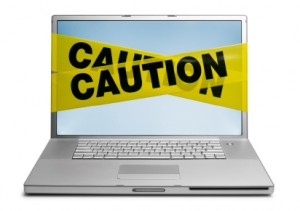If your computer is connected in any way to the outside world, you are a candidate for an Internet attack of some kind. That doesn’t just apply to your home computer either. Any Internet-connected device you have needs protection: PCs, tablets, and smart phones. Just as you purchase insurance for your vehicles and pay for medical insurance, you must be willing to take active steps to ensure both your computer and assets are protected.
Intruders often break into your computer through viruses attached to email, but there are numerous other ways for your personal information to be compromises. What many people don’t realize is that a hacker isn’t looking to steal a few dollars from you. Their ultimate goal is to use your computer as a gateway to all of your personal information as well as stealing from others.
 In effect, Trojans and malware break into your computer, wait until you think you have fixed the damage, and then reappear hours, days, or even months later. Once they’re on your computer, they often install new programs that let them continue to use your computer – even after you plug the holes they used to get onto your computer in the first place. These backdoors are usually cleverly disguised so that they blend in with the other programs running on your computer. To stay safe from these problems, online security must be accomplished on two levels: your computer and you.
In effect, Trojans and malware break into your computer, wait until you think you have fixed the damage, and then reappear hours, days, or even months later. Once they’re on your computer, they often install new programs that let them continue to use your computer – even after you plug the holes they used to get onto your computer in the first place. These backdoors are usually cleverly disguised so that they blend in with the other programs running on your computer. To stay safe from these problems, online security must be accomplished on two levels: your computer and you.
Steps to Keep Your Computer and Network Secure
Anti-Virus Programs
Think of scam artists who look for creative ways to get you to admit them into your home. Once inside, they may try to steal your valuables or try to harm you in some way. There are many ways you might use to learn about scams going on in your area: neighborhood watch, the local news, or a local home security company.
An anti-virus program serves the same purpose for your computer. When the anti-virus program vendors learn about a new virus, they provide an updated set of virus signatures that include that new one. Through features provided by the updated anti-virus program, your home computer also automatically learns of this new virus and begins checking each file for it, along with checking for all the older viruses. However, unlike scam artists, viruses never completely fade away. Their signatures remain part of the master version of all virus signatures.
There are a number of good freeware and commercials anti-virus programs, so shop and compare. Whatever anti-virus program you choose will only work as well as you use it. All of them must be updated on a regular basis so they can recognize the new scam artists in your PC neighborhood.
The anti-virus program you choose should past the following tests:
- Demand test: Does it allow you to check individual files on demand?
- Update test: Can you update the virus signatures automatically?
- Respond test: How many ways can you respond to an infected file? Can the virus checker clean a file?
- Check test: Can you check every file that gets to your home computer, no matter how it gets there? Can this test be automated?
Update, Update, Update!
Windows Update should be set to happen automatically. Other programs on your computer will often times report patches that should also be updated. One of the main reasons computer security is compromised is neglect. No matter how busy you are, the few minutes it takes to update Windows and install software patches may be the difference in a pleasant online shopping experience and an identity theft nightmare.
Home Network Firewalls
The firewall acts much like a guard when it looks at network traffic destined for or received from another computer. It determines if that traffic should continue on to its destination or be stopped. The firewall “guard” is important because it keeps the unwanted out and permits only appropriate traffic to enter and leave the computer. A firewall stands between your home computer and the Internet. It lets you control which traffic your computer accepts. It also controls which of your programs can connect to the Internet. There are free firewall products that provide the capabilities you need to secure your home computer. Commercial versions have even more features that can further protect your computer.
Passwords
A strong, alphanumeric password with at least eight characters is an easy way to help defend your personal information online. Follow the practice of using a unique password with every account you have. You should use passwords not only on your home computer but also for services you use elsewhere on the Internet. All should have the strongest passwords you can use and remember, and each password should be unique and unrelated to all other passwords. A strong password is a password that is longer than it is short, that uses combinations of uppercase and lowercase letters, numbers, and punctuation, and that is usually not a word found in a dictionary.
If remembering all of those passwords seems too daunting there is a simple solution. There are a number of thumb drives available specifically designed to store all of your passwords. Simply insert the drive in a USB port, and your completed database of passwords is instantly available. The strengths of this method are that you aren’t relying on your memory and someone would have to have that drive to get your passwords. There is one downside – don’t lose the thumb drive!
Steps to Making Yourself More Secure
There are a number of online security measures that have more to do with your own choices and actions that software and hardware decisions.
Be Conscious Where You Are When You Shop Online
If you are shopping online in a public place, make sure you are using a secured Wi-Fi connection. It is better to wait until you get home if there’s no secure connection. Anyone in range of that unsecured server at Starbucks might be helping themselves to your computer and its information. It could even be that nice looking young woman sitting right beside you.
Be Conscious Where You Are Shopping Online
Not only do you need to be aware of where you are physically, but you need to aware of the sites you are shopping on. Always look for the 128-bit encryption symbol on your web indicated by a padlock on your browser address bar. Secure sites will always begin with https.
Never Give Personal Information Through Email
Ignore any email asking you to confirm password and other personal information in a reply. Always contact the merchant directly if you have any doubt about requests for personal information you receive.
Watch What You Click
Be careful about clicking on hyperlinks you run across in search engine results and holiday e-cards, as well as on social networking sites like Twitter and Facebook, even if it appears that your friends are suggesting a link for you. Always verify the URL address of any link you run across to ensure it will direct you to a safe, reputable website.
Use a Secondary Payment Method
Many online purchases can be made using PayPal and other such services. By paying with PayPal, you do not have to re-enter personal information for the site you are buying from. Prepaid Visa and American Express cards are also excellent choices to have around for making purchases online. This method keeps you from having to provide any kind of link to your personal banking or credit card information.
As you became an adult, you learned that you needed to spend time and money to repair and replace those things around your living space and your car that need your attention. You learned you had to spend time and money to modify them to meet your needs and to keep you and others safe during their use. You accepted these responsibilities and costs as part of the total cost of ownership of that car and living space.
Your home computer is no different. There is the initial money that you pay to purchase that system. Then there are additional costs to tailor it and to keep you and the others who use your system safe. These additional costs are also your responsibility, and they are part of the total cost of ownership of your home computer.
There is also a certain amount of continuing personal responsibility you must take every time you connect online. After all, it’s your identity and your assets. If you don’t, who else will?
©2011 Off the Grid News
 Off The Grid News Better Ideas For Off The Grid Living
Off The Grid News Better Ideas For Off The Grid Living



